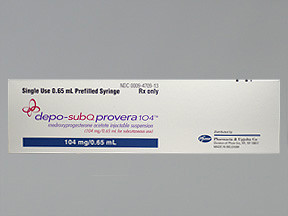MEDROXYPROGESTERONE ACETATE (CONTRACEPTIVE) - SUBCUTANEOUS
PHONETIC PRONUNCIATION: (med-ROX-ee-proe-JES-ter-one AS-e-tate)
COMMON BRAND NAME(S): Depo-SubQ Provera
GENERIC NAME(S): medroxyprogesterone acetate
Uses
USES: This medication is used to prevent pregnancy. Medroxyprogesterone is like a natural hormone made by the body. It works mainly by preventing the growth and release of an egg (ovulation) during your menstrual cycle. It also makes vaginal fluid thicker to help prevent sperm from reaching an egg (fertilization) and changes the lining of the uterus (womb) to prevent attachment of a fertilized egg. Medroxyprogesterone is also used to treat endometriosis. It works by lowering the amount of certain hormones in the body and decreasing the growth of abnormal tissues that cause endometriosis. This helps reduce pain and other symptoms. Using this medication does not protect you or your partner against sexually transmitted diseases (such as HIV, gonorrhea, chlamydia).
How to use MEDROXYPROGESTERONE ACETATE (CONTRACEPTIVE) - SUBCUTANEOUS
HOW TO USE: Read the Patient Information Leaflet if available from your pharmacist before you start using medroxyprogesterone and each time you get a refill. If you have any questions, ask your doctor or pharmacist. This medication is given by injection under the skin in the stomach area or upper thigh as directed by your doctor, usually once every 3 months. Before starting this medication, you must have a negative pregnancy test. The first injection is usually given during the first 5 days of your menstrual period or 6 weeks after the delivery of your baby if you are breast-feeding. Follow your doctor's exact instructions if you are switching from another birth control method. Repeat the same dose every 12 to 14 weeks. If you are using this medication at home, learn all preparation and usage instructions from your health care professional. Before using, check this product visually for particles or discoloration. If either is present, do not use the liquid. Learn how to store and discard medical supplies safely. Before injecting each dose, clean the injection site with rubbing alcohol. Change the injection site each time to lessen injury under the skin. Be sure the medication is at room temperature before use. Shake the syringe well for at least 1 minute before each injection. Use this medication regularly to get the most benefit from it. If more than 14 weeks pass between injections, you could become pregnant. Use a form of non-hormonal birth control (such as condoms, diaphragm, spermicide) to prevent pregnancy until you can get the next injection. Your doctor may direct you to first have a pregnancy test before your next injection.
Side Effects
Precautions
Interactions
Overdose
Images
Reviews
Warning
WARNING: This medication may cause serious bone loss which may not return to normal after you stop using it. The risk of bone loss increases with longer use of this medication. This medication should not be used for longer than 2 years unless other birth control methods will not work for you. An important time when your bones continue to build up is during your teenage and young adult years. Use of this medication may increase the risk of weak/brittle bones (osteoporosis), which can lead to broken bones when you are older. Talk with your doctor about the risks and benefits of this medication and other birth control choices. Do not use this medication if you smoke cigarettes/use tobacco and are over 35 years old. Smoking raises your risk of stroke, heart attack, blood clots, and high blood pressure from hormonal birth control (such as the pill, patch, ring). The risk of these serious problems increases with age and with the number of cigarettes you smoke. Do not smoke or use tobacco.
Disclaimer
IMPORTANT: HOW TO USE THIS INFORMATION: This is a summary and does NOT have all possible information about this product. This information does not assure that this product is safe, effective, or appropriate for you. This information is not individual medical advice and does not substitute for the advice of your health care professional. Always ask your health care professional for complete information about this product and your specific health needs.


No Reviews Yet